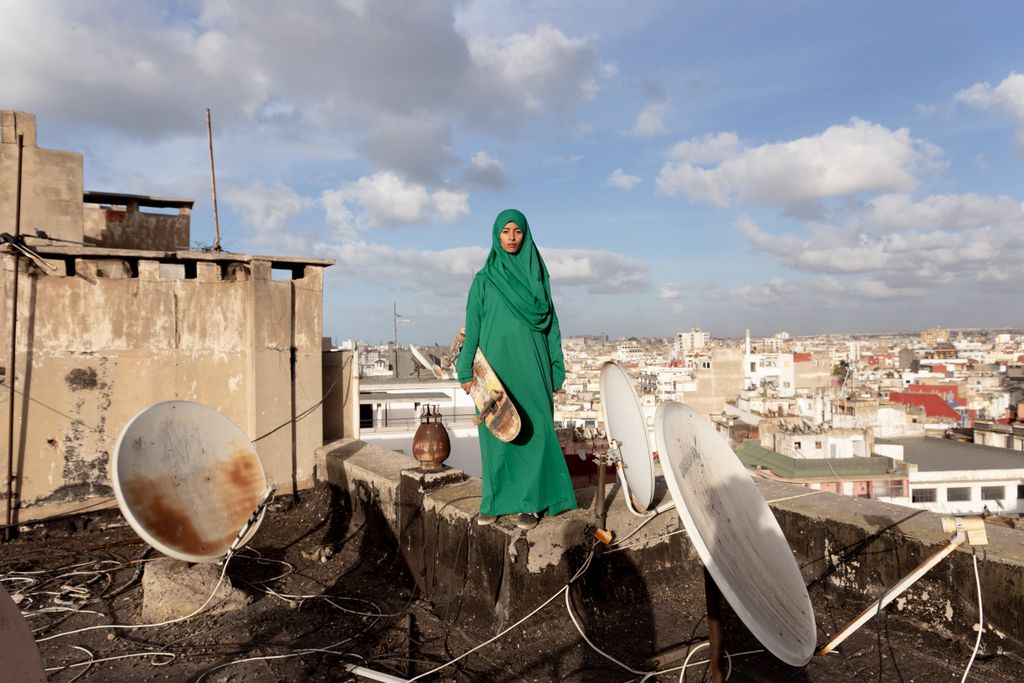Our mission is to bring Africa and Spain closer
Through outreach, educational, economic, and cultural activities, we foster mutual understanding and strengthen Hispanic African relations.

Autora: Chantal Pinzi (Italia)
El proyecto Shred the Patriarchy se centra en las historias de algunas mujeres marroquíes que practican el skate a pesar de las duras repercusiones sociales y familiares que se ven obligadas a sufrir por esta elección aún no aceptada dentro de la sociedad marroquí. La reputación internacional de Marruecos como país reformista y progresista sigue siendo contradictoria cuando se trata de las mujeres, que continúan enfrentándose a importantes obstáculos. Su participación social, económica y política, así como en el ámbito deportivo, sigue estando minimizada o completamente negada. El skateboarding no es una excepción. Si eres mujer no deberías practicarlo. Me pareció muy importante descubrir las voces de esas pocas mujeres que decidieron romper las reglas no dichas y hacer shred a pesar de los juicios y castigos que reciben por su espíritu rebelde transformando el skate en una forma de resistencia al patriarcado. Ya no pueden aceptar ser lo que la sociedad quiere que sean las mujeres: criaturas de debilidad. Podría documentar cómo la subcultura del monopatín puede ser una herramienta para promover el empoderamiento y la inclusión social, especialmente para las chicas que tienen tan pocas oportunidades de expresarse y comunicarse libremente. Muchas de estas mujeres se criaron con padres conservadores. Lo más importante era convertirse en una buena musulmana, lo demás no importaba. Sus sueños y sus voluntades, en particular la de patinar, se han visto oprimidos por un sistema que no comprende los beneficios y la importancia de valores como la aceptación, la empatía y la unidad que se comparten en la comunidad del skate. En un skatepark, las niñas pueden jugar con seguridad a todo pulmón y niños de distintos orígenes pueden jugar juntos creando lazos que trascienden las diferencias de color, religión y origen social. Pero los estereotipos que han hecho del skate un dominio de género obligan a estas mujeres a hacer una elección radical entre sus tradiciones y la subcultura que las obliga a abandonar los muros de sus hogares para vivir la vida que ellas mismas han elegido. Las mujeres que conocí y sus historias son valientes ejemplos de cómo un objeto aparentemente sencillo, un trozo de madera con ruedas, les permite realizar y confirmar sus identidades al darles la capacidad de levantarse cada vez que caen en la vida, igual que hacen cuando se caen de un monopatín. PH. Hilam con su hiyab verde en la azotea de un edificio abandonado de Casablanca, un lugar que desde hace meses se ha convertido en su hogar cuando en el de la familia no fue aceptada por su voluntad de practicar este deporte.
The project Shred the Patriarchy focuses on the stories of some Moroccan women who practice skateboarding despite the hard social and family repercussions that are forced to suffer for this choice not yet accepted within the moroccan society. The international reputation of Morocco as a reformist and progressive country it is still contradictory when it comes to women which continue to face significant obstacles. Their social, economic and political participation, as well as in the sport’s sphere is still minimized or completely denied. Skateboarding is no exception. If you are a woman you should not practice it. I found it quite important to discover the voices of those few women who decided to break the unsaid rules and to shred around despite the judgments and punishments they receive because of their rebel spirits transforming skateboarding in a form of resistance to patriarchy. They can no longer accept being what society wants women to be: creatures of weakness. I could document how the skate subculture can be a tool to promote empowerment and social inclusion especially for girls who have so few opportunities to express themselves and communicate freely. Many of these women were raised with conservative parents. The most important thing was to become a good muslim, the rest was not important. Their dreams and their wills, particularly that of skating, have been oppressed by a system that fails to understand the benefits and the importance of those values as acceptance, empathy and unity shared within the skate community In a skatepark, girls can safely play at the top of their lungs and children of different backgrounds can play together by creating ties that transcend differences in color, religion and social background. But the stereotypes that have made skateboarding a domain of gender require these women to make a radical choice between their traditions and the sub-culture forcing them to abandon the walls of their homes for living their own chosen life chosen. The women I met and their stories are brave examples of how an apparently simple object, a piece of wood with wheels, enables them to realize and confirm their identities by giving them the ability to stand up every time they fall in life just like they do when they fall off a skateboard. PH. Hilam in his green hijab on roof top of an abandoned building in Casablanca, a place that for months it has turned into her home when into the family’s one was not accepted because of her will to practice this sport.
Chantal Pinzi
Valoración jurado: El sujeto único contra las azoteas del espacio urbano, además de la fuerza de la temática escogida.